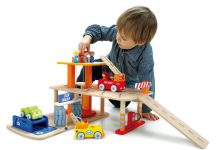Your Child’s Personality – Does it Influence Success?
HARINI CHARI finds out.
Will the shy girl open up someday? Will the school bully become an even bigger one when he grows up? Will the class clown do anything beyond acting silly?
We all wonder about kids and their personalities as they grow up. But what really happens when they enter adulthood? Maybe the class bully has gone on to become a politician or a leader of some sort where he can take things in his hands, the shy girl might have become a computer whiz and, the clown could have found success in marketing!
Every child is different, and so is his personality. There is no ‘good’ or ‘bad’ personality; every child is unique with special characteristics and qualities. Personality, which takes shape depending on how you react to these traits, is increasingly gaining importance in the success equation.
This has contributed to a growing trend of recruitment searches for executives to incorporate personality testing, such as Hagberg’s procedure. Hagberg’s questionnaire, which predicts if a candidate can fit into the corporate culture, suit the job requirements and work well in teams, costs a cool $4,000 per head!
And this all important factor of personality trait has its foundations in childhood. A study conducted by researchers at the University of California, Riverside, the Oregon Research Institute and University of Oregon has shown that behaviours and traits in childhood are good indicators of how they will turn out as adults. The 40-year study which trailed 2,400 children into adulthood, concluded that we are pretty much the same person we were as a child.
This finding makes it all the more important for us to understand ‘personalities’ and how we can provide the right nurture to bring out the best in them.
Understanding personality traits of children will help us understand them better and provide them with the right environment for them to learn and bloom. This will help us as parents to motivate them better and guide In a way that is best suited for them. Careful observations about children’s personalities could reveal where they are heading in life, and what kind of people they are going to turn out to be. The research was based on four attributes: self-minimizing, verbally fluent, adaptive and impulsive
The Sensitive Child
These children are generally not assertive and will show signs of fearfulness and caution. A child of this personality type may be overly shy and have several anxieties, that in the long run, pose as a hurdle to making friends easily. But these kids are tuned in to the feelings of others and can easily sense the feelings and emotions of others through body language and signs.
Sensitive children experience deep emotions, which can be physically sapping as well. If they are happy, they are ecstatic; if they are sad, they can be overwhelmed. In extreme cases where children are unable to manage their own feelings, they have exhibited behaviours such as banging their heads on the wall and screaming.
Tips For Caregivers
Parents could easily become overprotective or penalising with such kids. But what they need is an abundance of empathy and encouragement to try new activities and experiences. Adolescence could be an anxious stage for these kids, a time when they will need your patient understanding.
School Success
Sensitive children respond well to compassionate teachers who display empathy. They get motivated when their efforts are recognised and will work hard, just to please their parents and teachers. Provide ample opportunities for this child to talk about what holds her back and other anxieties such as bullying in school. This personality types need lots of hand-holding from parents and will achieve great success in a nurturing environment.
The Defiant Child
These children enjoy defying rules, authority and parents. They are independent thinkers and have a mind of their own. They are also supremely perfect in every activity that they take on and are like to give their best in most tasks they undertake. These kids have a knack for organising their visual memory and like to be very much in control of their environment and their world. Perhaps this is the contributing factor to his stubborn streak.
Tips For Caregivers
It can be trying having to deal with defiance. Be firm and consistent in your discipline methods. The more the parents show negative emotions, the more defiant he gets. Calming behaviour from caregivers and discussions that preserves his sense of self-esteem bring out the best in him.
School Success
Give this child lots of control over his environment. Let him set his own goals and let him take ownership over his success. Set aside a study place for him and allow him the space to pace his own learning. Lots of pep-talk and a respectful class and home will eventually teach him that there are incentives in working with people. He will do well in school and if given the right opportunity, can thrive in creative careers such as business.
The Self-Absorbed Child
This child may appear to be disinterested and easily tired with everything around him. The self-absorbed child will usually not be curious to explore his surroundings and may thrive in regular routines and familiar surroundings. This passive child, although seemingly quiet, has a vivid imagination which can blossom as he grows older.
Tips For Caregivers
Never give up on this child. He may reach out to you in very subtle ways. Respond to that soft cue with zeal and support. If you or caregivers and teachers show him disinterest, then he will over time simply shut out and stay in his own world.
School Success
This child is an individual worker and can thrive on introverted pursuits such as reading. Gently introduce him to teamwork by creating opportunities for one-to-one playdates. Once he learns to enjoy company, you can progress to small groups. He’ll thrive on bookish pursuits so he’ll do well in academic work that requires focussed quiet work. He may require some help in work that needs investigation, experimenting and working with others.
The Enthusiastic Child
They are talkative, display high levels of intelligence and are enthusiastic about life. They like to take charge and be involved in seeking knowledge.They can be the bordom-busters in social settings but sometimes, they can also be annoying and maybe mistaken to be attention-seeking. They are interested in a wide spectrum of activities and thrive on intellectual conversations.
Tips For Caregivers
Celebrate his personality. Do not shut him up; instead teach empathy and show him how to be sensitive to the feelings of others and his surroundings. Give him ample opportunities to pursue creative tasks.
School Success
This child is a delight to teach, for he thrives on knowledge and pursuits of new learning opportunities. He will participate actively in both group and individual learning. As a self-starter, he will also inspire and motivate fellow mates. He will make a good candidate for leadership positions. Balance his energy by also giving him opportunities like trips to community service organisations,
that will allow him to focus on others
Personality is very much a part of us and what we are made of. Though some life events can affect and change personality, it remains a vital factor in predicting future behaviour. Prof Daniel Hart, Director of the Centre for Children and Childhood Studies at Rutgers University, believes that personality is not limiting factor as far as success in life is concerned and that personalities can be rounded off and the rough edges could be gently softened over time with love and patience. The overly shy kids could be drawn out of their shells and taught some skills in socialising and the bully could be reminded to think of feelings of others.




































